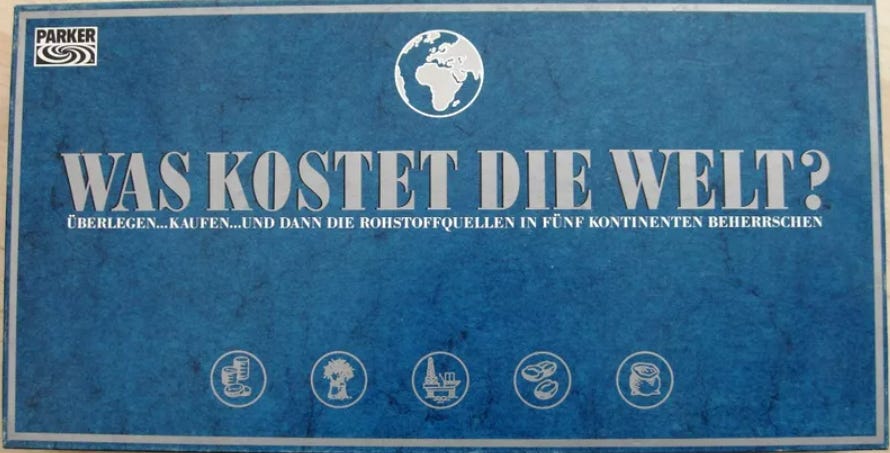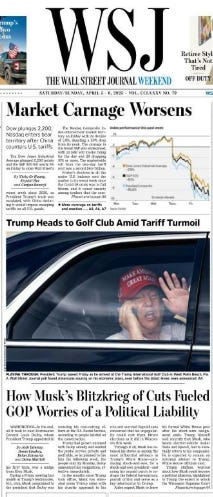
This week’s review of the news about logistics and the logistics in the news is all about the money, money, as Trump’s tariffs hit on the 2d last week. It has been turmoil, to say the least, with colliding effects from the tariffs themselves and the uncertainty the President sows into every act. And as the week ended with a crash-bang, Trump seemed unfazed and ready for a weekend on the links, setting the stage for the front page seen ‘round the world (below).
Ukraine
While the grinding attrition of RF personnel, kit, and strategic resources and capabilities continues, as a brief pause, let us return to primal military logistics, subsistence. Allow me to introduce Ukraine’s Magic Food Army, a Ukrainian charity serving the armed forces, demonstrates ability to deliver wholesome, homemade foods to frontline units.
On the Russian side, we are learning much about long-term storage and maintenance as WWII howitzers are ‘de-preserved’, adding to the stock of ‘legendary weapons’ upon the battlefields in Ukraine. In addition to the malaise and creeping crippling decrepitude of much infrastructure, economically, the bad news keeps coming, as Russian oil sales are down 17% in March from 2024. In Putin’s Not Enough Guns and No Butter economy, every ruble lost in sales in a multiplied opportunity cost, depriving the broader economy of even more as industry takes up an increasing share of revenues.
Tariffs
The Economist was brutal, but if possible, it’s even worse than even their depiction of self-harm. Krugman gets us closer, with ‘malignant stupidity’. There was a surreal touch to the Trump Administration’s “Liberation Day” – the name for the imposition of taxes by other terms – landing the day after April Fool’s Day. Hungover from too much mirth, to spend the next day awaiting the announcement of the tariff strategy stretched all nerves. And the administration did not disappoint with what has been described as an insane calculation of tariff rates that goes Pole to Pole, putting an island of penguins and another of volcanos under customs sanction. It further takes unaccountably ruthless aim at small, developing economies like that in Lesotho. Jamie Dimon, reflecting the broad Wall St. dismay that meanness has cost them untold wealth, has gone from January’s ‘get over it’ to recession and stagflation worries.
Buy Canadian movement takes hold. Antipathy to American products is already being priced in by Goldman Sachs as part of the “headwinds” stalling economic growth. Tariffs make for new strange regional alignments; China, Japan, South Korea soften trilateral relations. Economic toll already in play, with auto maker Stellantis closing plants in direct response to tariffs.
If you are interested in deep dives, Anna Jerzewska looks in detail at de minimis and e-commerce. While this screams niche, a lot of folks depend more than they realize upon this trade model.
“The European Union has a ‘strong plan’ to retaliate against tariffs”: EU executive chief Ursula von der Leyen, Tuesday. Beyond that, and surprising no one, Europe is cooling especially to the American defense industry, especially Starlink. Despite doing everything possible to make such deals as unpalatable as possible with punitive tariffs which may conflict with NATO article 2, security threats to allies, and uncertain support for Ukraine at war, the administration’s representatives seem disconcerted that customers across the pond are disinterested. And while Europe has happily accepted a dutiful second’s role to US global dominance, it is going to be a cold shock for Trump and Co. to face the reality that economically and politically, if it hangs together, the EU is a match for America. With the price tags that come with meaningful arms deals, nobody is paying for goods that will be made ineffective by instability in spares, maintenance, or tech updates. This will further complicate US defense budgeting, which will have to account for higher prices on their own purchases. Putting the substance behind PM Carney’s sad words on the end of the American Era we all knew so well, Dr. Elizabeth Saunders summarizes well the broad toll Trump’s trade policy will have on American diplomacy.
Ending the week, the WSJ front page circled the globe as Americans took the streets in significant numbers across the country in Hands Off protests.

Transport
Maersk does the funniest thing and buys Panama Canal railway.
MTA rolled out new transit maps and highlighted historical versions. Visualization of systems are not only informational but identifying, they create the sense of a place to denizens and visitors alike, even when we don’t realize the phenomenon. In other news, with NYPD announcing historically low levels of violent crime, it is difficult not to credit in part the role of congestion pricing for getting more people on the streets to create safer conditions for all
Maritime
Adding to the concerns around the growing and costly phenomenon, fake insurance papers for Russian Ghost Fleet are among the challenged. Europe and Turkey, maritime dominance ‘from Syria to the Black Sea?’ Chokepoint control is a macro-strategic precursor, as discussed in “Straits of Civilization” here. Maersk, in its usual domain, is offering ship-building capacity for defense.
Dark Logistics
Fort Bliss – no, Virginia, irony no longer exists – under consideration for use in deportee detention. The Vapor Trail of Tears, with USTRANSCOM moving many of the detained, will be stain upon the wealth and strength of the US. That we could waste such resources imprisoning those desperate for a better life rather than using that capacity to help them will be a cross our generation will bear deep into posterity.
Environment
Rodent poison affects raptor populations.
Good climate policy is good security strategy. As the US ditches its efforts in this area, European defense is taking the matter seriously.
Sand mining, an issue historically dear to me as I grew up adjacent to one of the most important centers of the activity, Cow Neck Bay, New York. It built the skyline of Manhattan. But like much of construction, the resource and environmental toll can be disastrous.
Mining Life
The notice of an upcoming walking tour of iron architecture in New York City from the Bowery Boys was well timed, as it has been a noticed feature of my own amblings. If you spend any time on foot among the large residential building of the Upper West Side, for example, you will ultimately be struck by the stonking scale of iron used in various bits of a building’s architecture. I daresay one could manufacture no small amount of ship’s cannon with the material available upon the island. In a wild world of the an ungoverned maritime space, where coastal defense is new again, it’s certainly within historical norms. More broadly, with the tariff policy of the administration threatening various critical supply chains, one’s logistical sort of mind turns to other alternate methods of acquisition or rationing. As in WWII, when silk was needed for military use, women’s stockings were either eliminated or replaced with new synthetic alternatives. A century later, as modern consumption has expanded beyond the comprehension of any previous civilization, even Americans several decades prior (you can tell by the garbage shoots in older buildings), I am willing to bet that the landfills will be the new mines of the tomorrow. We have thrown away no small amount of useful material. It is very likely that will become valuable to extract as the prices of imported production inputs become prohibitive.
In Memoriam, The Logistics of Casualties
The American military has two modes of transport for America’s military casualties – a complex, multi-stop tour of medical facilities, or the mournful direct journey home. Transiting the gap from military to civilian, the dignified transfer of remains is a small but meaningful ceremony wherein the Armed Forces honor and pass to the family the loved ones lost. More of logistics addresses death than we like to think about, but at least in the traditions which adorn the practices the bereaved find some measure of solace. Given the magnitude of the event, the effort of allies and the respects they had already paid to American soldiers, it was distasteful to many the President chose a golf event over attendance at this moment.
History
Challenge your image of Rosie the Riveter with this reminder that Black American Women stepped up to serve the industrial cause as well.
…to close, a bit of humor.






